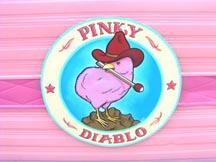
THE GOAT CASTLE MURDERS -
There was blood, and the mistress of Glenburnie was nowhere to be found, that hot August night in 1932 - but there was no corpse. Bloodhounds were brought in to assist police and a large search party of prominent
Miss Jennie was the town recluse and eccentric. Born in 1864 to a wealthy and prominent
Miss Jennie was 68 years old at the time of her murder. She had never married, and only allowed one person to enter Glenburnie during the 28 years she lived there. That one person was her cousin, the equally eccentric Duncan C. MINOR, who visited Miss Jennie every evening. It was thought that
Duncan was not much of a suspect, but Miss Jennie's neighbors were. Richard "Dick" DANA and his companion, friend, and caregiver, the spinster Octavia DOCKERY, were immediate suspects. Dick Dana, once a popular figure in Natchez, had suffered declining mental health, over the years, and depended upon Octavia to care for him. Octavia was herself, something of an eccentric. Neither had any source of income, so Octavia began raising farm animals on the grounds of their old house, Glenwood, which had been inherited by Dick, from his parents. Chickens, geese, and goats roamed about the yard, sometimes finding their way to the porch of the old structure that was badly in need of repair. And so it was that Glenburnie became known as The
For the first time in years, outsiders entered The
Finally there was a confession. Emily BURNS, a Natchez resident who owned a rooming house, admitted that she and George Pearls had visited Miss Jennie in an attempt to obtain a loan. Miss Jennie, angry over the intrusion, had drawn her pistol. It was then than Pearls shot her. Other evidence collaborated the story, and Emily was convicted and sent to prison.
Emily Burns spent less than eight years, in prison, obtaining a pardon by Gov. Paul B. JOHNSON, Sr., in 1940.
And what about Octavia and Dick? Their lives took a definite turn for the better. For a fee of .25, visitors could tour the grounds; for another .25, visitors could actually enter The
Dick Dana died in 1948, a few months before Octivia's death in April, 1949. The

